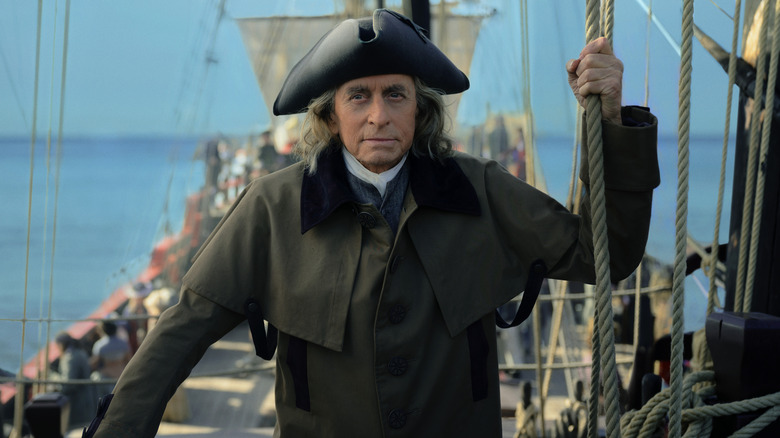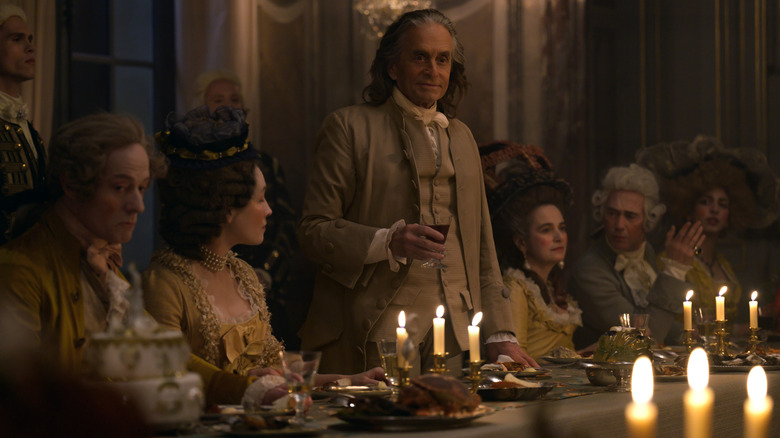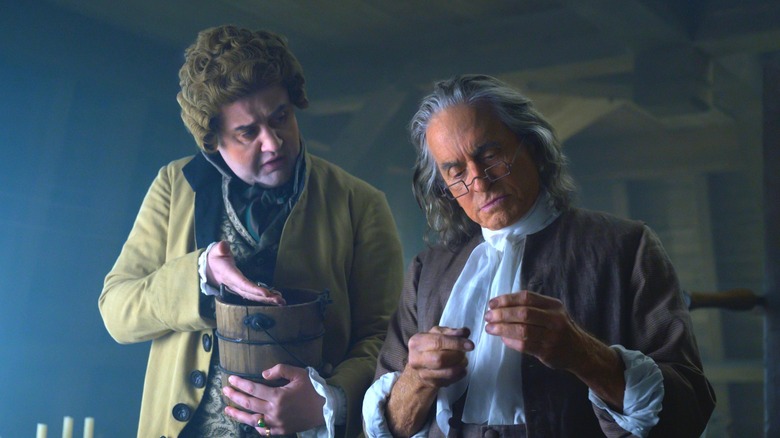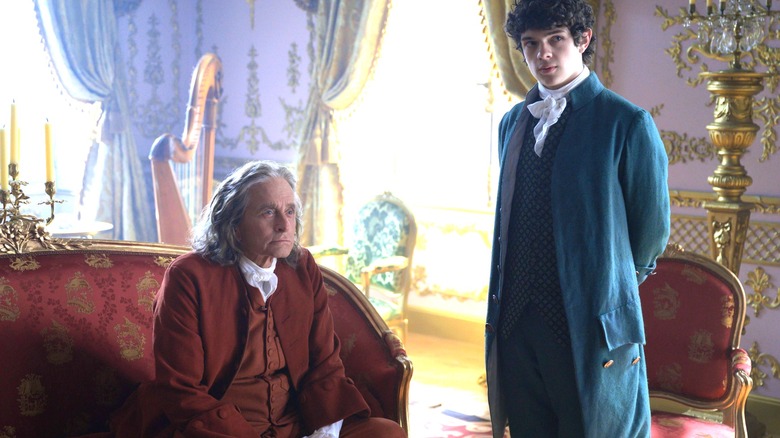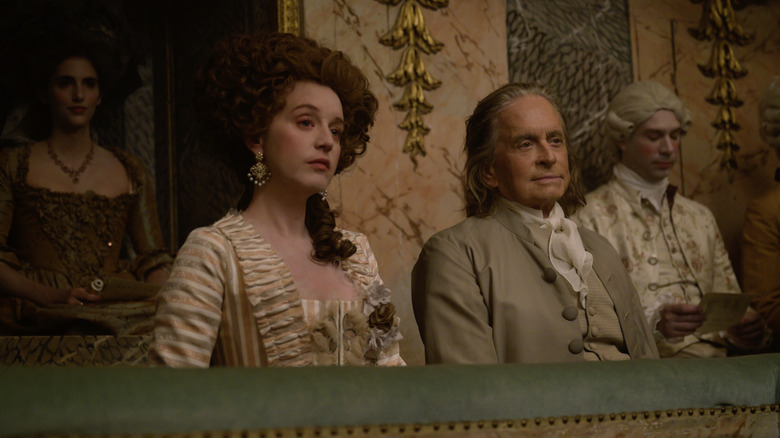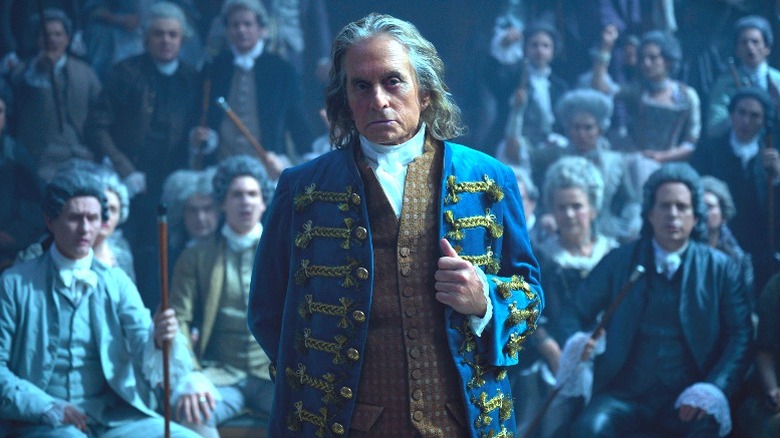Things The Apple+ Series Franklin Left Out Of The True Story
Benjamin Franklin: inventor, diplomat, writer, intellectual, smart-ass, and all-around crème de la crème of the United States' 18th-century Revolutionary War figures. Enlightenment-era thinker who helped write the United States' constitution? Check. Ambassador to France from the U.S.' original 13 colonies because he could match French savoir-faire? Check. Publisher, printer, and prolific writer who also wrote some funny things like a letter about farting? Check. Pioneer inventor who paved the way for research into electricity? Check.
Well, in 2024 Apple+ set itself the daunting task of capturing the very colorful Franklin and his accomplishments on the small screen in the show "Franklin," featuring award-winning actor Michael Douglass as the walking stick-toting Franklin. Season 2's eight episodes focus exclusively on Franklin's time as an ambassador in France attempting to procure an alliance between the older superpower and the nascent United States. And for those unaware: France's assistance was crucial to the 13 colonies of the so-called "New World" to winning the fight against their British overlords across the Atlantic. So far, the show has garnered middling critical and public success.
But, while "Franklin" does an admirable job tackling complex material that could, by its nature, come across as rather dull, it doesn't get everything right. In fact, it leaves out a lot of things entirely, including Franklin's correct appearance, his relationship with his father, the details of his political dealings, the role of other diplomats in negotiations with France, and a well-rounded version of the main character, himself.
Not the right-looking Franklin
While the first entry in our list could qualify as, "Something Franklin got wrong," we're going to say this entry describes something the show leaves out: Franklin's signature pot belly (and his entire appearance to go along with it). We've all seen portraits of Franklin, at least from one specific, older age bracket: round, wire-framed glasses, double chin, thick throat, hairline that recedes into a near-skullet, some puffy bits of his clothing at the neck and wrists, pot belly, and so forth.
In the Apple+ show "Franklin," however, Franklin looks more like "Michael Douglas in a wig with way too much hair," as Time Magazine correctly states. The truth is: If you didn't know Douglas was playing Benjamin Franklin, you wouldn't even be able to guess Douglas' role. Also, Franklin was 70 years old when he went to France, but Douglas, who is 79, looks younger than 70 in the show.
Why the omission of Franklin's real appearance? Douglass just didn't want to deal with the makeup and prosthetics. This isn't an unreasonable request for a person who's nearly 80. And, we could also argue that Douglas' appearance in "Franklin" is the least important element of the show. However, the omission stands out precisely because Franklin's appearance is so iconic and recognizable.
Other diplomats had bigger roles
The Revolutionary War broke out in 1775, and it wasn't long before the 13 colony's Continental Congress took action to secure an alliance with France. That being said, Benjamin Franklin wasn't the only diplomat sent over to Europe — he was one of three, with Silas Deane and Arthur Lee being the other two. While Franklin was indeed the team lead, it was Lee who accepted the role first in January 1776. And yet, sites like the U.S. State Department call Franklin the "First American Diplomat," and the National Constitution Center rather anachronistically calls him "America's first rock star." Franklin, it seems, accepted his role in the mission in September 1776.
Of course, a television show can't possibly get every minute historical detail correct. The eight-episode Apple+ series "Franklin" has to condense things even further, and choose what to leave in and what to leave out. But in general, "Franklin" writer and producer Howard Koder admits that he left out much of Deane and Lee's roles in events, saying to Smithsonian Magazine, "You have to decide which one of these horses you are going to try and ride to the end of the story." He also says, "There were a lot of people who came and went over the eight years that [Franklin] was in France." But ultimately, the show is named "Franklin" and not "the various and sometimes nameless Americans dispatched to France during the Revolutionary War."
Franklin's son is completely gone
The Apple+ series "Franklin" definitely goes out of its way to include as much of its father-son dynamic as possible, between Benjamin Franklin and his grandson, Temple. Yes, it's true that Franklin brought the 16-year-old Temple along with him to France to act as secretary for the duration of the journey. And yes, it seems that the two were fairly close. Ultimately, Temple got enamored with French life and liked it so much that he never returned to the newly-formed United States with his father after the Revolutionary War ended. But, this is where "Franklin's" portrayal of Franklin's family ends.
Conspicuously absent from "Franklin" is Franklin's son, William — aside from one disparaging comment. It's true that William wasn't in France during negotiations, and the action of the series remains firmly rooted in Paris. However, William played a prominent role in Franklin's life and inclinations, especially during the time of the Revolutionary War. Namely: William was a loyalist to England and opposed the American Revolution. As a result, Franklin essentially ended their relationship.
While the addition of this complication wasn't necessarily crucial for "Franklin's" storyline, it could have added an extra dimension to the interactions between Franklin and Temple, especially if Franklin was sometimes preoccupied with his son. William, it should be noted, was tossed in prison for two years for passing information along to England, and even formed his own fighting unit to harass colonial troops.
No strong narrative backbone
The next omission on our list might not necessarily be a fault of "Franklin," but of historical fact coupled with the show's specific source material. Also, this omission is rather vague, but substantially important to both the show's historical accuracy and the strengths of "Franklin's" plot — or lack thereof. That is, "Franklin" lacks a powerful, focused narrative backbone because we just don't know all the details of what Franklin did in France.
As The Hollywood Reporter describes, "Franklin" pops around from vignette to vignette, with each one being an interesting nugget of storytelling. But ultimately, the show's plot amounts to a disjointed collection of shady dealings, something-something powdered Parisian aristocracy, hints of amorous liaisons and interests, some interpersonal gobbledygook and drama, and presto: instant alliance. The show does include historical factoids like Franklin being a big hit in French high society despite wearing a plain brown jacket. But, such elements when combined don't make for a singular, comprehensive, how-to tale of Franklin's goings-on during his Revolutionary War negotiations with France.
So what did "Franklin" leave out here? Well, the show left out what it didn't know: the less-cinematographic, nitty-gritty political blah-blahs. Plus, "Franklin" is actually based on a 2005 book from author Stacy Schiff, "A Great Improvisation: Franklin, France, and the Birth of America." This means that we've got to filter what "Franklin" includes through this book, too, rather than directly through historical records.
'Franklin' left out a likeable Franklin
Sites like The Hollywood Reporter describe how "Franklin" might have pushed a bit too hard into a "tough and acerbic" version of Franklin, as AARP puts it. "Franklin" wants to depict Franklin as "rascally and patriotic," but instead depicts him as a jerk and a womanizer. At the same time, he's more of a passive participant in the series than an active protagonist who drives events forward. In other words, "Franklin" leaves out what folks like about Franklin, and also undercuts his diplomatic efforts — whatever they were and however they ought to be depicted on the screen.
In lieu of further details, it's true that fellow diplomats Silas Deane and Arthur Lee might have done the lion's share of the political work while Franklin massaged the crowd, so to speak. The Hollywood Reporter's point, though, is that if the Apple+ show is named "Franklin," it shouldn't leave out everything about Franklin that makes him an American hero of yore, even at the risk of some romanticization. Instead, the show pushes too much into current-day deconstructive trends regarding interpreting the past.
History vs. Hollywood articulates this omission similarly, saying that "the story of his [Franklin's] crowning political achievement feels like it's been filtered through a modern-day social lens that has once again hamstrung the filmmakers from sufficiently paying tribute to the individual and his accomplishments. Instead, he's been reduced to a character who often warrants our criticism more than he welcomes our respect."
